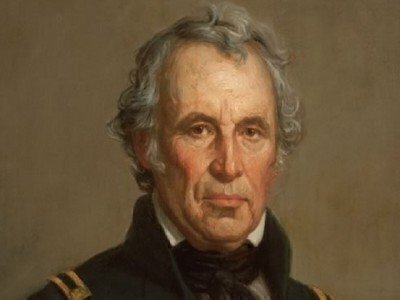On November 24, 1784, future President Zachary Taylor was born in Virginia. Taylor became an unexpected obstacle to slavery’s expansion, until his sudden death in 1850.
 Taylor’s death on July 9, 1850 shocked a nation that was in a heated debate about issues that eventually led to the Civil War. The details about how President Taylor died are still in dispute today.
Taylor’s death on July 9, 1850 shocked a nation that was in a heated debate about issues that eventually led to the Civil War. The details about how President Taylor died are still in dispute today.
But as a Southern and slaveholder, the former military officer was at the point of forcing a possible armed confrontation between the North and the South, since he objected to moves to force New Mexico to becoming a pro-slave state.
How Taylor got to a ceremony at the site of the Washington Monument on July 4, 1850, where he reportedly ate some tainted iced milk and cherries, mirrored the life journeys of three former Presidents: George Washington, Andrew Jackson and William Henry Harrison.
Taylor grew up in a wealthy Southern family that owned plantations and slaves, and became a career army officer. During the Mexican-American War, General Taylor led the United States forces to victory at Buena Vista, making him a national hero.
Taylor ran as a Whig presidential candidate in 1848 and he wasn’t a professional politician. Once he took office in March 1849, it became clear that Taylor, the military man, was more interested in preserving the Union than the art of politics or pleasing Congress.
The President decided to press for statehood for the newly acquitted territories of California (which could include Utah) and New Mexico, and to let the regions hold their own constitutional conventions. This guaranteed that the territories would join the Union as anti-slavery states, tipping the balance in the Senate to the North.
Senator Daniel Webster of Massachusetts and Senate Majority Leader Henry Clay pressed for a compromise that only admitted California as an anti-slavery state. Siding with Taylor was the Whig leader William Seward, who later played a prominent role in the Lincoln administration. Taylor also supported New Mexico in a border dispute with Texas.
In February 1850, Taylor told southern leaders who threatened to secede that prisoners, “taken in rebellion against the Union, he would hang ... with less reluctance than he had hanged deserters and spies in Mexico.”
Congressional leaders agreed on a bill that later became the centerpiece of the Compromise of 1850 and had planned to present it to Taylor. But Taylor fell ill on July 4 and died five days later at the age of 65.
Officially, he died from cholera morbus, and today, the prevalent theory is that Taylor suffered from gastroenteritis, an illness exacerbated by poor sanitary conditions in Washington.
The secession crisis was still in full swing when the little-known vice president, Millard Fillmore of New York, was thrust into office. The Northerner soon supported an amended Compromise of 1850, which was passed in September 1850. The compromise did reduce the threat of Southern secession for several years, but it included the controversial Fugitive Slave Act.
In all, Taylor was President for a total of 16 months. His very brief legacy as President included his belief that states and the federal legislatures should handle some constitutional issues, and he believed Presidents should be above politics. His threat of force against Southern secessionists was also noteworthy.







